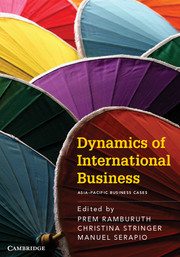Book contents
- Frontmatter
- Dedication
- Foreword
- Contents
- Contributors
- Preface
- Part I The Environment of International Business
- Part II Strategy and Entrepreneurship in International Business
- Part III Managing People in International Business
- Part IV Operating in International Markets
- 19 Learning from experience: Purchasing industrial machinery from China
- 20 Country of origin labelling and the New Zealand seafood industry
- 21 Ubisoft: Competing in the global video gaming industry
- 22 Taobao vs eBay: The fight between a local nobody and a global giant
- 23 The internationalisation of COSCO and its investment in New Zealand
- References
24 - Developing education exchanges between China and the West: The case of Bricknowledge and Mericia
Published online by Cambridge University Press: 05 August 2013
- Frontmatter
- Dedication
- Foreword
- Contents
- Contributors
- Preface
- Part I The Environment of International Business
- Part II Strategy and Entrepreneurship in International Business
- Part III Managing People in International Business
- Part IV Operating in International Markets
- 19 Learning from experience: Purchasing industrial machinery from China
- 20 Country of origin labelling and the New Zealand seafood industry
- 21 Ubisoft: Competing in the global video gaming industry
- 22 Taobao vs eBay: The fight between a local nobody and a global giant
- 23 The internationalisation of COSCO and its investment in New Zealand
- References
Summary
Institutions are now, more than ever, seeking opportunities to provide global exposure and learning for their students through international exchange. In 2009, three business students from Grant MacEwan University in Edmonton, Alberta, Canada travelled to Beijing to fulfil the practicum requirement of their Asia-Pacific Management program and attain this learning. Their placement was with a non-governmental organisation (NGO) called Bricknowledge Education Group (hereafter Bricknowledge) in China. Bricknowledge was formed in 2003 with the goal of establishing an international platform to address issues facing the development of education in emerging markets and to promote innovation, policy-making and cooperation (and therefore cross-cultural understanding) in the education sector among the BRIC (Brazil, Russia, India and China) nations and developed nations, and in particular between China and the West.
The director and staff of Bricknowledge welcomed the MacEwan students and helped them to settle in and adjust to life in Beijing. The students were given the opportunity to learn about the structure of education in China. Importantly, the Chinese government is focused on ensuring quality education, and has sought to raise education levels. As part of their learning, the Grant MacEwan University students analysed the significant similarities and differences, and sought to identify possibilities for collaboration, between North American and Chinese educators, in order to propose ways in which Bricknowledge might develop and capitalise on education exchange opportunities.
- Type
- Chapter
- Information
- Dynamics of International Business: Asia-Pacific Business Cases , pp. 236 - 242Publisher: Cambridge University PressPrint publication year: 2013



